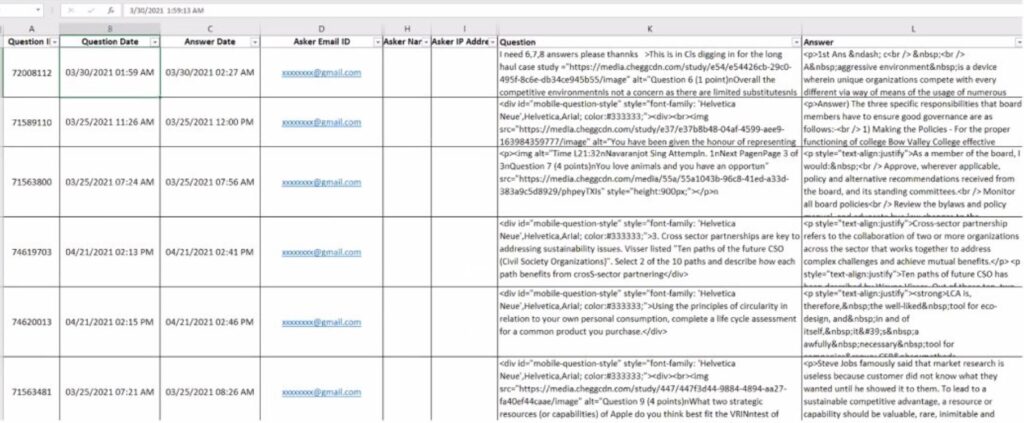The 2nd Canadian Symposium on Academic Integrity, an event that takes place every two years, was held virtually on 22 and 23 June 2021. The Symposium was a large scale event, with over 700 people registered and the third big academic integrity conference of 2021 (following the International Center for Academic Integrity Conference and the European Conference on Academic Integrity and Plagiarism.
Although aimed at a Canadian audience, being virtual the event was attended by delegates from all around the world. I gave the keynote address looking at academic integrity communities, a theme that was also picked up elsewhere at the conference. You can read more about the conference on Twitter with the #CSAI21 hashtag.
Research into academic integrity and contract cheating in Canada has developed very quickly over a short space of time. Some people presented multiple times, being involved in a lot of interesting ongoing research projects and other collaborative activity.
I attended as much of the symposium as I could, but with five parallel sessions it was impossible to attend everything. Here are three of my take-home messages from the symposium.
File Sharing Sites Won’t Go Away
The student use of file sharing sites has to be the academic integrity story of the pandemic. It was also one of the discussions that appeared repeatedly at the conference. These were also called pay-to-pass sites in other presentations, a rather fitting expression.
Bow Valley College have done a lot of work on this area, after they found students posting their exam questions and assignments online. Bow Valley College even showcased the information they were able to get back from investigations with one of the sites, with some students surprisingly being brazen enough to register with their educational email address.

A little reported concern was exactly how academics feel when they discover their students using file sharing sites. Heather Martin from Bow Valley College found staff were feeling defeated, demoralised and disrespected, thinking that all their hard work creating course materials was not valued.
Ebba Kurz said that students need regular reminders that they are breaching copyright and not respecting intellectual property when they post materials on file sharing sites. Ebba recommended making a statement about this explicit as part of course materials.
Brenna Gray questioned the Canadian use of homework systems. It’s an idea I haven’t come across in the UK, but apparently some Canadian institutions require students to pay extra to take required off-the-shelf courses. They tend have to complete assessments within those courses. Unsurprisingly, the answers to such courses are readily available online for a fee.
Certainly there are undesirable practices happening in higher education which, although they don’t excuse contract cheating, do show why students may choose to not focus their own attention on certain assignments. We do need to question why such undesirable developments are happening and how we can ensure that academic integrity really is a key discussion for everyone in education.
We Can Always Learn From The Past
Although new methods that students can use to cheat come along all the time, there’s very little in the academic integrity field that is completely new and has never been studied before.
I mention that as there were quite a few talks which repeated ideas which I’ve seen at other conferences already this year, or which built upon things I remember being talked about 10 years ago. After all, a lot of Canadians are now seeing contract cheating as a brand new problem (even though, as I mentioned when I spoke at the conference, it was almost 15 years to the day when the first presentation of the research Robert Clarke and I conducted on contract cheating took place).
We can always learn from the past. Previous research studies are much more readily available than they’ve ever been before. So many studies are now accessible through Google Scholar. But at the same time, in the interest of building community, we have to find ways to support people joining the academic integrity field and give them the opportunity to share what they’re discovering (and express their feelings).

Nowhere was the need to remember the past made clearer than in the presentation Sarah Eaton gave about the history of contract cheating in Canada. Sarah had tracked down largely forgotten theses and news stories, including a (failed) 1972 attempt to make what we would now call contract cheating illegal.
Sarah also estimated that contract cheating services in Canada were doing $10 million (Canadian Dollars) of business per year back in the 1980s. We often underestimate the sheer scale of the contract cheating industry.
We Will Keep Hearing More And More Horrific Stories About Contract Cheating
It is rare that I’m surprised by stories of the techniques used by the contract cheating industry.
Universities are already having to deal with the problem of what happens when a disgruntled writer or company contacts them to say a student has been using their services (sometimes when an attempt to blackmail a student fails).
A new variant of that technique has emerged, falling much more into the phishing levels, where scammers are inventing contract cheating cases either in an attempt to collect student details, or to get universities to pay them money in sympathy for their loss of earnings.
Universities in Canada reporting that they are now receiving #contractcheating phishing attempts, a difficult area to address alongside other attempts to blackmail and extort students #academicintegrity #CSAI21 pic.twitter.com/HqWwFXczRz
— Thomas Lancaster (@DrLancaster) June 23, 2021
We also heard of companies reporting when graduates had worked for them back to the original university. Presumably this happens when the graduate decides they no longer want to continue as a writer. At the same time, false reports were also being made, a difficult situation when these also have to be investigated.
Canadian universities sell advertising space around the campus, including in bathrooms. One delegate discussed how their university had been taking paid adverts from a contract cheating service advertising in Mandarin and the posters remained active for some time. The rise of local contract cheating services each supporting only one course was also explored.
One contract cheating provider managed to get the contact details of all students on a course and found out details of a quiz they had upcoming. It then emailed personal invitations to all students saying they could “assist” them with that quiz (for a fee).
Other contract cheating providers have started running their own conferences and have even provided academics with research funding to make themselves seem legitimate. It is disappointing that people are falling for the contract cheating industry tricks, but we need to stay alert and also think about how we support academics who get taken in by the contract cheating industry.
